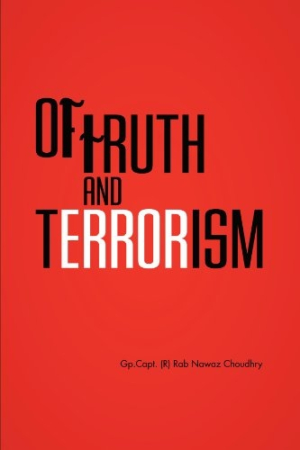Of Truth and Terrorism
“History is like a mother who protects her children from impending dangers acquired through her past experience,” instructs Rab Nawaz Choudhry, a retired officer of the Pakistan Air Force, in Of Truth and Terrorism. “It records all events, good or bad, and saves them so that the human beings could learn lesson [sic] from their past mistakes and make their lives more pleasant than their forefathers.”
Choudhry is a student of history, especially the history of South Asia and the Middle East, many countries of which he visited during his more than four decades of military service. He has much to say about those parts of the world, and how the United States and, notably, the Bush administration have acted not only as if in complete ignorance of that history but also as if in defiance of it.
A frequent visitor to the United States and avowed friend of the people he met and worked with here, Choudhry tries to speak to an American audience as a friend, as someone trying to warn them of impending disaster.
“No superpower stays forever,” warns the author. “You need to come to terms with justice to save your name” for posterity, adds Choudhry, and learn to treat allies not as “slaves” but as “friends and partners,” allowing them to “hold their own distinct opinion.”
Of Truth and Terrorism is a collection of more than fifty articles the author had published in newspapers, magazines, and journals. They are written not in American or British English but in a Pakistani-inflceted English familiar to anyone who has picked up a copy of Dawn, The Nation, Pakistan Observer, or any of the other major English-language dailies published in Karachi, Lahore, or Islamabad. He writes mostly for his fellow Pakistanis, especially the educated class, but also for European and American officials whose staff officers peruse these papers to take the daily pulse of Pakistan. That pulse, according to Choudhry, is beating at a furious pace, and to a tempo that is increasingly anti-American.
Western readers can learn a great deal about what Pakistanis truly think about how their nation and the rest of the Muslim world is treated (or mistreated) by the United States and its allies. Choudhry pulls no punches when he jabs at the West for its unequivocal support of Israel to the detriment of its Arab neighbors, or for what he calls its overreaction to, and misunderstanding of, terrorism, Iraq, Iran, the Afghan Taliban, and Osama bin Laden; the latter, he notes, is seen as both a hero and a martyr in the Islamic world.
Many of Choudhry’s articles are about the internal political turmoil in his country and the corruption and “cowardice” of former President Pervez Musharraf and his inner circle.
Most of what Choudhry writes will probably anger or even outrage many Americans, but, at the same time, it should give them insight into what price his country pays in blood and treasure to remain an ally of the United States. His writing is sprinkled with local idioms and varieties of spelling, capitalization, and grammar that may require many to reread some passages, but it comes from the heart, the head, and the soul. It should be required reading for anyone serving in, or who has a relative serving in, Afghanistan or Iraq, as well as anyone with input into making or carrying out American policy in the region.
Reviewed by
Mark McLaughlin
Disclosure: This article is not an endorsement, but a review. The publisher of this book provided free copies of the book and paid a small fee to have their book reviewed by a professional reviewer. Foreword Reviews and Clarion Reviews make no guarantee that the publisher will receive a positive review. Foreword Magazine, Inc. is disclosing this in accordance with the Federal Trade Commission’s 16 CFR, Part 255.

